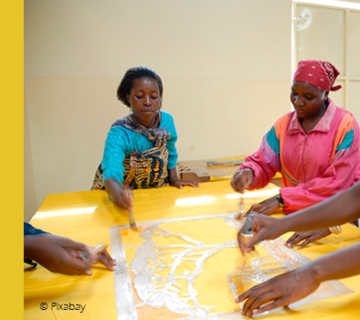The insecurity arising from worldwide challenges such as globalization, climate change and the coronavirus pandemic seems to awaken in many people a new need for a spiritual life. But, as Chiara Lubich says in the following text, spirituality for today is characterized by a strong community dimension.
One of the more original characteristics of this spirituality of unity is its communitarian dimension. In the two thousand years since the time of Christ, the Church has experienced the flowering of the most beautiful and fruitful spiritualities one after the other. Sometimes they occurred in the same period, adorning the Spouse of Christ with many saints, like precious pearls and diamonds. But in all this splendor one factor has always remained constant; spirituality was focused primarily on the advance of the individual toward God. …
But times have changed. Now the Holy Spirit is inspiring people to walk together, in fact, to be of one heart and soul with all who share their convictions. The Holy Spirit has motivated our Movement from the beginning to make this outreach toward others. In the spirituality of unity one advances toward God by going through one’s neighbor. “I—my brother—God,” we say. You go to God with other people, your brothers and sisters, or rather, you go to God through others. In our era the reality of communion is coming to the forefront; the kingdom of God is sought not just in individual persons but in the midst of the people.
Spiritualities characterized as individual usually make precise demands on those involved, such as: Solitude and flight from the world to reach mystical communion with God within. The silence that solitude requires. Separation from others by a veil, a cloister as well as a particular habit. The practice of all kinds of penances, sometimes very difficult ones like fasts and vigils, in imitation of the passion of Christ.
In the way of unity we do seek solitude and silence in response to Jesus’ invitation to go to your room to pray, and do avoid others if they lead us to sin, but generally we welcome our brothers and sisters, we love Christ in our neighbors, in every neighbor, as Christ is living in them or can be revived in them through the help we offer. We seek to be united with our brothers and sisters in the name of Jesus, who guarantees his presence in our midst (see Mt 18:20).
In the individual spiritualities it is like being in a magnificent garden (the Church), looking with admiration at a single flower, the presence of God within. In a collective spirituality we love and admire all the flowers in the garden, every presence of Christ in others. And we love him in others as we love him within ourselves. …
Chiara Lubich
From: Chiara Lubich: Essential Writings – spirituality, dialogue, culture New City Press, Hyde Park NY, 2007, pp. 27-30.


 Italiano
Italiano Español
Español Français
Français Português
Português




Se non amiamo l’uomo che vediamo non possiamo amare Dio che non vediamo. E’ bugiardo chi dice di amare Dio e odia suo fratello. Nel fratello c’è Dio, se non lo amo, non amo Dio che è in lui, come è in me e in tutti. “Qualunque cosa facciamo ad un fratello, Dio la ritiene fatta a Se'”. Ne abbiamo la conferma dalla gioia che viene nel cuore quando amiamo il fratello. Nei giardini vicino casa, c’è un povero che vive steso su una panchina, mi sono avvicinata a lui, donandogli da mangiare e facendogli delle domande per conoscerlo e fargli sentire la mia amicizia. Ogni giorno lo cerco, sento un vero trasporto verso di lui, sento la presenza di Gesù che mi chiede di amarlo in quel povero!
Grazie per la tua condivisione e per questo tuo amore delicato.
ciao,Jesus is in everyone, so we need to Jesus in every person even your self, because you cant love Jesus and dont love your neighbor ,because Jesus is their. and prayer to is essential to our life, and we should try ans stay away from sin